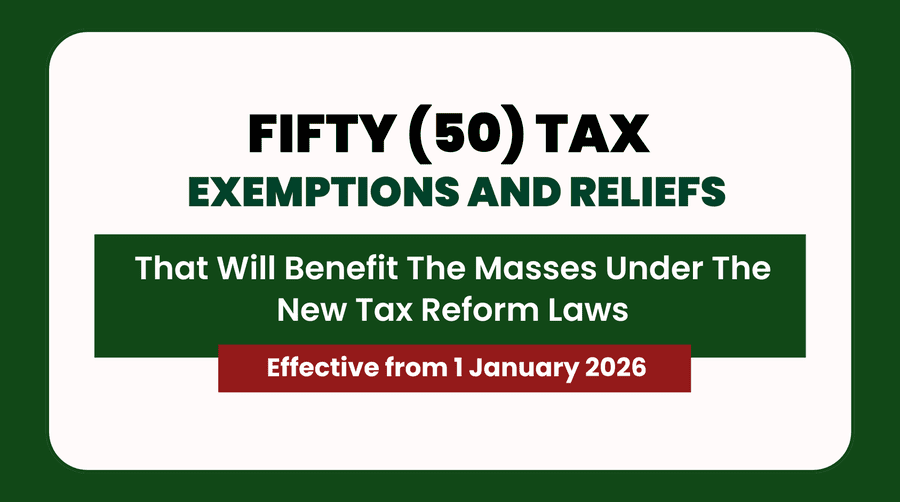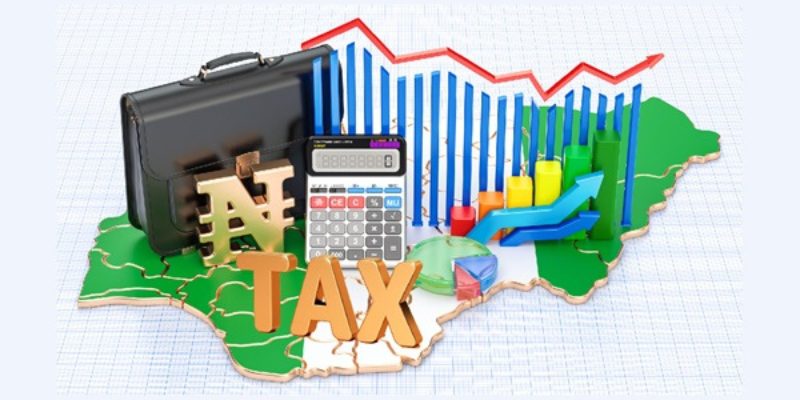Taiwo Oyedele, Chairman of the Presidential Committee on Fiscal Policy and Tax Reforms, has announced that Nigeria’s new tax laws will provide 50 reliefs and tax exemptions for low-income earners, average taxpayers, and small businesses beginning from January 1st, 2026.
This means a significant portion of your income, from minimum wages and pensions to rent payments and investment gains, will no longer be subject to taxation.
However, it is important to know how to file these tax exemptions; that is why this article breaks down the entire list of 50 new tax reliefs and provides the step-by-step instructions you need to ensure you file correctly and claim every Naira you are entitled to keep.
Read also: Understanding the new tax regime: All you need to know

Here are the 50 tax exemptions from 2026
𝐏𝐞𝐫𝐬𝐨𝐧𝐚𝐥 𝐈𝐧𝐜𝐨𝐦𝐞 𝐓𝐚𝐱 𝐨𝐫 𝐏𝐀𝐘𝐄
1. Individuals earning the national minimum wage or less (exempt)
2. Annual gross income up to ₦1,200,000 (translating to about ₦800,000 taxable income) is exempt
3. Reduced PAYE tax for those earning an annual gross income up to ₦20 million
4. Gifts (exempt)
𝐀𝐥𝐥𝐨𝐰𝐚𝐛𝐥𝐞 𝐃𝐞𝐝𝐮𝐜𝐭𝐢𝐨𝐧𝐬 & 𝐑𝐞𝐥𝐢𝐞𝐟𝐬 𝐟𝐨𝐫 𝐢𝐧𝐝𝐢𝐯𝐢𝐝𝐮𝐚𝐥𝐬
5. Pension contribution to PFA
6. National Health Insurance Scheme
7. National Housing Fund contributions
8. Interest on loans for owner-occupied residential housing
9. Life insurance or annuity premiums
10. Rent relief – 20% of annual rent (up to ₦500,000)
𝐏𝐞𝐧𝐬𝐢𝐨𝐧𝐬 & 𝐆𝐫𝐚𝐭𝐮𝐢𝐭𝐢𝐞𝐬 – 𝐄𝐱𝐞𝐦𝐩𝐭
11. Pension funds and assets under the Pension Reform Act (PRA) are tax-exempt.
12. Pension, gratuity or any retirement benefits granted in line with the PRA
13. Compensation for loss of employment up to ₦50 million
𝐂𝐚𝐩𝐢𝐭𝐚𝐥 𝐆𝐚𝐢𝐧𝐬 𝐓𝐚𝐱 (𝐂𝐆𝐓) – 𝐄𝐱𝐞𝐦𝐩𝐭
14. Sale of an owner-occupied house
15. Personal effects or chattels worth up to ₦5 million
16. Sale of up to two private vehicles per year
17. Gains on shares below ₦150 million per year or gains up to ₦10 million
18. Gains on shares above the exemption threshold if the proceeds are reinvested
19. Pension funds, charities, and religious institutions (non-commercial)
𝐂𝐨𝐦𝐩𝐚𝐧𝐢𝐞𝐬 𝐈𝐧𝐜𝐨𝐦𝐞 𝐓𝐚𝐱 (𝐂𝐈𝐓) – 𝐄𝐱𝐞𝐦𝐩𝐭
20. Small companies (turnover not more than ₦100 million and total fixed assets not more than ₦250 million) pay 0% tax
21. Eligible (labelled) startups are exempt
22. Compensation relief – 50% additional deduction for salary increases, wage awards, or transport subsidies for low-income workers
23. Employment relief – 50% deduction for salaries of new employees hired and retained for at least three years
24. Tax holiday for the first 5 years for agricultural businesses (crop production, livestock, dairy, etc.)
25. Gains from investment in a labelled startup by venture capitalists, private equity funds, accelerators or incubators.
𝐃𝐞𝐯𝐞𝐥𝐨𝐩𝐦𝐞𝐧𝐭 𝐋𝐞𝐯𝐲 – 𝐄𝐱𝐞𝐦𝐩𝐭
26. Small companies are exempt from 4% development levy
𝐖𝐢𝐭𝐡𝐡𝐨𝐥𝐝𝐢𝐧𝐠 𝐓𝐚𝐱 – 𝐄𝐱𝐞𝐦𝐩𝐭
27. Small companies, manufacturers and agricultural businesses are exempt from withholding tax deduction on their income
28. Small companies have tax exemptions from deductions on their payments to suppliers
𝐕𝐚𝐥𝐮𝐞 𝐀𝐝𝐝𝐞𝐝 𝐓𝐚𝐱 (𝐕𝐀𝐓) – 0% 𝐨𝐫 𝐄𝐱𝐞𝐦𝐩𝐭
29. Basic food items – 0% VAT
30. Rent – Exempt
31. Education services and materials – 0% VAT
32. Health and medical services
33. Pharmaceutical products – 0% VAT
34. Small companies (≤ ₦100m turnover) are exempt from charging VAT
35. Diesel, petrol, and solar power equipment – VAT suspended or exempt
36. Refund of VAT on assets and overheads to produce VATable or 0% VAT goods and services
37. Agricultural inputs – fertilisers, seeds, seedlings, feeds, and live animals
38. Purchase, lease or hire of equipment for agricultural purposes
39. Disability aids – hearing aids, wheelchairs, braille materials
40. Transport – shared passenger road transport (non-charter)
41. Electric vehicles and parts – exempt
42. Humanitarian supplies – exempt
43. Baby products
44. Sanitary towels, pads or tampons
45. Land and building
𝐒𝐭𝐚𝐦𝐩 𝐃𝐮𝐭𝐢𝐞𝐬 – 𝐄𝐱𝐞𝐦𝐩𝐭
46. Electronic money transfers below ₦10,000
47. Salary payments
48. Intra-bank transfers
49. Transfers of government securities or shares
50. All documents for the transfer of stocks and shares
Read also: Tax: Pensions, stipends, remote earnings of Nigerians in diaspora to be exempted – Taiwo Oyedele


How to file the new tax exemptions by 2026
Speaking during a Technext Spaces on X, Kalu Aja, a financial analyst known for simplifying complex financial policies, said the simplest ways Nigerians can take control of their finances and enjoy these tax exemptions under the new tax regime are by learning self-assessment, leveraging e-portals, visiting the tax offices or hiring a tax professional.
Step 1: Learn self-assessment and keep records of everything
For every deduction you want to claim, you must have an official document to prove you made the payment. This requires you to be in charge of declaring your income and filing your own taxes. Always keep a file (digital or physical) of all your payslips, bank statements, receipts, and agreements for at least six years. If the tax authority decides to audit you when you file your deduction, these documents are the only proof you have to support your claims.
Step 2: Contribute to your retirement savings account
You can reduce your income by the funds you contribute to a statutory retirement savings account. The statutory contribution is typically 18%, that is, 10% from the employer, 8% from the employee. If you are self-employed, you can open an RSA and contribute to it, effectively acting as both employer and employee.
Step 3: Leverage e-portals or physical offices of FIRS or SIRS
An individual or business owner can file a personal income tax return electronically via the e-Filing portals provided by the Federal Inland Revenue Service (FIRS) or the State Board Internal Revenue Service (SIRS). Alternatively, they can submit paper tax returns at the nearest FIRS or SIRS tax office where they reside or use the services of an accredited tax professional or tax agents.
Step 4: Hire or consult a tax professional for your business
Small business owners must engage a qualified tax accountant or consultant, especially when considering financial strategies for periods like 2026 and beyond. This professional guidance is essential to structuring the flow of revenue and expenditure in a way that is compliant with the law yet results in the lowest possible tax exposure.


Documents required for filing taxes
According to the Federal Inland Revenue Service (FIRS), here are the major documents required before filing:
- Tax identification number (TIN) or RC number
- Completed tax return forms (manual or electronic)
- Audited financial statements – including Statement of profit/loss, financial position and notes.
- Tax computation schedules – reconciling accounting profits to taxable profits, showing all adjustments.
- Capital allowance schedules – detailing capital allowances claimed on various asset classes.
- Withholding tax credit notes – for taxes deducted at source on the company’s income.
- Tax exemptions/compliance certificates – if claiming any specific tax exemptions/reliefs.
- Supporting schedules/documents – transfer pricing policies, prior year losses carried forward, evidence for special deductions claimed.
Read also: How Nigeria plans to tax crypto holders and traders from January 2026






